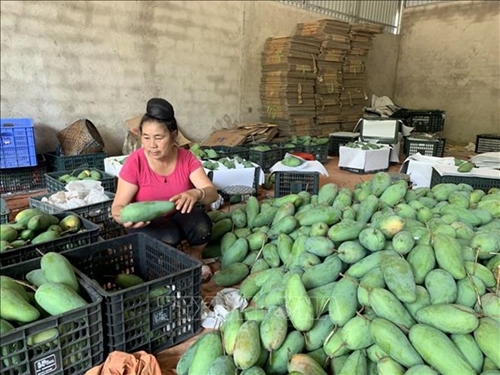The Chieng Hac cooperative in Yen Chau district is among the pioneers in Son La in shifting to organic cultivation. The cooperative’s members have chosen to focus on clean and safe agricultural practices since the founding more than 10 years ago. With more than 20 hectares of land under mango, the cooperative is able to export about 50 tonnes of fruit each year to Australia and China, generating average income of 200 million VND (8,575 USD) a year for each member.
    |
 |
|
Organic mango (Photo: dantocmiennui) |
Director of the cooperative Ha Van Son said members strictly follow rules on recording the entire cultivation process from the origin of saplings, soil conditions, the type of fertilizers to the procedures in caring for trees and harvesting fruit.
The cooperative uses only organic fertilizers and herbicides, he said, noting that their costs in the first years of cultivation would be higher than the costs of inorganic counterparts, but would then decrease, because the soil would gradually become more fertile, raising the productivity and fruit quality over the years.
Nguyen Huong Long, a member of the Chieng Xuan cooperative in Van Ho district, owns a 7-ha mango orchard and three hectares of fish ponds. He said he uses fermented small fish, maize and soy bean as fertilizer for mango. For insecticide, he uses ginger, garlic and chili.
Used to be the largest maize growing province in the country, Son La has switched to fruit trees and quickly become the second biggest fruit producer with more than 71,000 ha of orchards. Son La has developed 73 supply chains of organic fruits, bringing together 78 firms and agricultural cooperatives that produce a total of 13,000 tons of fruit a year.
Director of the province’s Department of Agriculture and Rural Development Nguyen Thanh Cong said in 2020, Son La will allocate more than 6.5 billion VND to assist agricultural companies and cooperatives in expanding organic farming.
Local authorities will also take measures to encourage farmers to change their farming habits and adopt biological technologies in production.
At the same time, the province plans to support the development of products of local advantage and supply chains towards sustainable and safe agricultural production.
Source: VNA